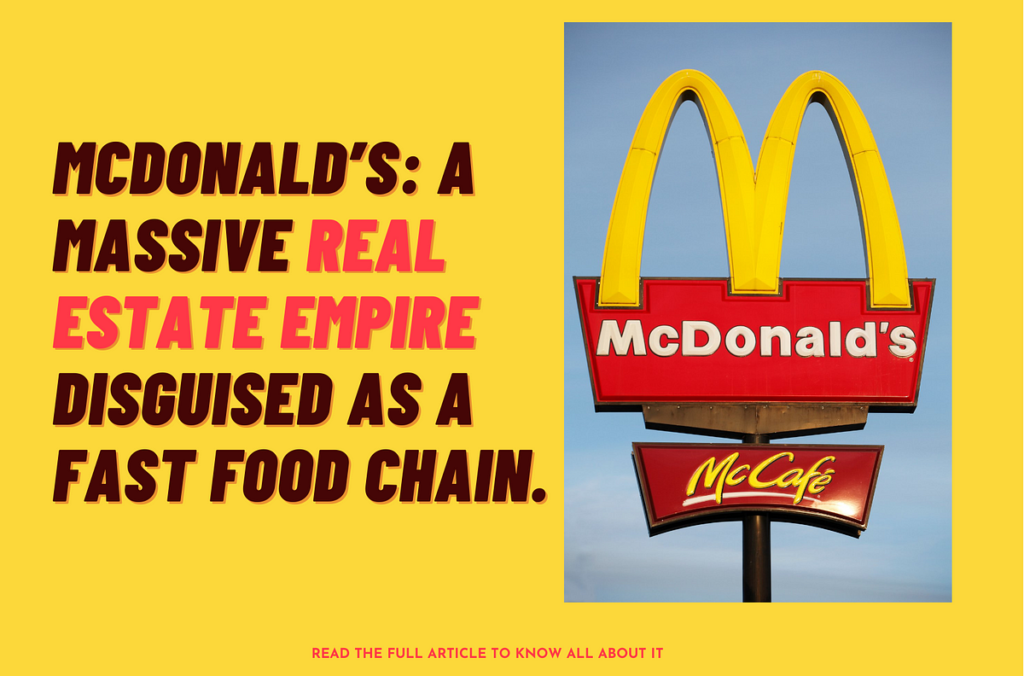Why McDonald’s is Not Just a Fast Food Chain but a Real Estate Giant

When you think of McDonald’s, the first thing that likely comes to mind is its iconic golden arches and the fast-food meals that have become synonymous with quick service dining worldwide. However, beneath the surface, McDonald’s operates as much more than just a fast-food chain. In fact, McDonald’s runs a real estate empire that functions more like a real estate giant, with a business model deeply rooted in property ownership and leasing.
The McDonald’s Real Estate Model
The real power behind McDonald’s real estate empire lies not in flipping burgers but in owning and controlling some of the most valuable commercial real estate across the globe. The company has built its business model around acquiring and leasing property, which it then rents to franchisees. This unique approach enables McDonald’s to generate substantial revenue from real estate, alongside its income from food sales.
Here’s how it works: McDonald’s buys or leases properties in prime locations, often in high-traffic areas that ensure a steady stream of customers. The company then leases these properties to franchisees at a markup. Franchisees pay a combination of rent and royalty fees based on their sales, which allows McDonald’s to earn revenue not only from the real estate but also from the franchisee’s operational succes.
The Importance of Location
One key reason McDonald’s succeeds in the real estate business is its ability to choose prime locations wisely. The company’s real estate team conducts extensive research and analyzes data to identify locations with high customer traffic potential. This strategic site selection drives franchisee sales and strengthens the long-term value of McDonald’s real estate assets.
In essence, McDonald’s ensures that successful franchisees boost the value of its property holdings. By placing franchisees in thriving locations, McDonald’s preserves and grows the worth of its real estate, creating a virtuous cycle of success.
A Reliable Revenue Stream
McDonald’s real estate strategy provides the company with a reliable and consistent revenue stream. Even during economic downturns, when consumer spending drops, McDonald’s continues to earn income from its real estate portfolio. Franchisees remain obligated to pay rent, regardless of their sales performance, which keeps cash flowing to McDonald’s even when the food business encounters challenges.
This stable revenue stream helps McDonald’s stay strong and resilient over time. While other businesses may face struggles due to fluctuating sales, McDonald’s benefits from diversified income sources that protect it from market volatility.
Leveraging Real Estate for Expansion
McDonald’s real estate strategy has also powered its global expansion. By owning and controlling prime real estate in key markets, McDonald’s has built a robust international footprint. The company uses its real estate strategy to confidently enter new markets, securing high-traffic locations that drive sales and attract customers.
Moreover, McDonald’s leverages its real estate assets to gain a competitive edge over other fast-food chains. While competitors may depend solely on food sales, McDonald’s dual focus on food and property allows it to outperform rivals in market share and profitability.
The Legacy of Ray Kroc’s Vision
Ray Kroc, the man who turned McDonald’s from a small burger joint into a global empire, laid the foundation for its real estate strategy. He understood early on that McDonald’s success would come not just from selling food but from owning the land beneath the restaurants. His vision shaped a business model that turned McDonald’s into one of the world’s largest real estate owners.
Kroc’s insight into the power of real estate continues to influence McDonald’s strategy. By emphasizing property control, McDonald’s built a business that remains profitable, resilient, and adaptable to changing market dynamics.
Real Estate as a Strategic Asset
McDonald’s real estate holdings are more than just physical locations—they represent a carefully curated portfolio of strategic assets. Each McDonald’s outlet is part of a broader, globally managed system that supports long-term growth and stability. By investing in key urban centers and growth corridors, the company ensures that its property assets appreciate over time, contributing significantly to its balance sheet. This strategic ownership allows McDonald’s to negotiate better deals, maintain control over branding, and support franchisees with favorable terms that encourage operational success.
Furthermore, McDonald’s real estate investments are often insulated from short-term market volatility due to their prime locations and diversified geography. The strength of these assets plays a crucial role in the company’s ability to innovate, fund new ventures, and remain competitive in an ever-evolving fast-food landscape.
Franchisee Alignment and Long-Term Value
Another advantage of McDonald’s real estate strategy is its ability to align the interests of the corporation and its franchisees. Because franchisees rent the locations from McDonald’s itself, both parties are incentivized to ensure the location performs well. Strong franchisee performance directly enhances the value of the underlying property, making McDonald’s real estate a central pillar of its corporate strategy.
This alignment fosters a stable, long-term relationship that benefits all stakeholders. With franchisees focused on running profitable restaurants and McDonald’s focused on maintaining valuable property, the synergy between operations and real estate becomes a major driver of success.
In conclusion, McDonald’s real estate model is a blueprint for business resilience and profitability. It showcases how leveraging property ownership alongside core operations can build a powerful, sustainable brand—one that goes far beyond just selling fast food.
Conclusion: The Power of Real Estate
While most people view McDonald’s as a fast-food leader, its real strength lies in its command of real estate. By owning and leasing prime commercial properties, McDonald’s has built a business model that proves both lucrative and sustainable. This unique model has helped McDonald’s flourish in a competitive industry and cement its role as a global real estate powerhouse.
For aspiring entrepreneurs, McDonald’s story offers a powerful lesson: success often depends not just on the product you sell, but on the solid foundation your business stands on.
